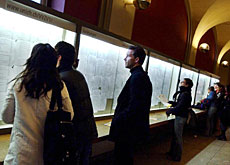New era begins at Swiss universities

Thousands of new students will be starting university on Monday under the Bologna system - the first time that degrees have been totally harmonised in Switzerland.
A record number of students have registered for the new academic year with figures said to be up by two per cent on last year. But the Bologna reforms have not been welcomed by everyone.
The changes form part of the European Union’s 1999 Bologna Declaration – to which Switzerland has signed up along with more than 40 other countries – which is aimed at harmonising degrees across the continent and encouraging study abroad.
Under the system, the first university degree, a Bachelor’s, can be awarded after three years, followed by a Master’s after a further two years. This replaces the old Swiss system of degrees and diplomas.
Switzerland first introduced Bologna in 2001 with Bachelor’s courses in some institutions, but Monday will be the first time that it has been applied across the board.
This year almost all new students, with the exception of medicine and veterinary students who can expect changes in 2007, will be studying under the new system.
Courses will also be subject to the Bologna education credits, which are transferable among institutions and countries.
The Federal Statistics Office, quoted on the Swiss news agency, said around 169,500 students had already registered for the academic year 2006/2007, two per cent more than the previous year.
It expects the number of students to continue to increase, reaching around 200,000 by 2015 and that there will be an equal number of degrees awarded to men and women by 2009.
Split views
But the reforms have come in for some criticism. The Union of Students in Switzerland has raised fears that some students could suffer financial hardship if forced to study full-time for shorter degrees because they would no longer be able to work part-time during their studies.
To help combat this problem the union called earlier this month for a grant system which would be managed on a federal level. It also criticised inequalities between the cantons over student bursaries.
However, the Bologna process is widely thought to be bearing fruit. In September the Organisation for Economic Cooperation and Development praised efforts made to reform higher education in Switzerland.
It said the percentage of graduates to the population had increased from 10.4 per cent to 25.9 per cent between 2000 and 2004 and noted the higher graduation rate was largely due to the changes under the Bologna process.
But despite this progress, the organisation said the graduation figure was well below the OECD average of 34.8 per cent.
swissinfo with agencies

More
Bologna Reform
The Bologna Declaration of 1999 aims to create a European Higher Education Area by 2010.
Switzerland is one of 45 countries in Europe that signed up to the accord, whose aim is to harmonise European higher education to make it more attractive internationally.
The new university course is divided into two stages: three years for a Bachelor’s degree and two more to obtain a Master’s degree.
The first Bachelor courses started in 2001. The first degrees were awarded in 2004 (1,057, mainly in law and economy).

In compliance with the JTI standards
More: SWI swissinfo.ch certified by the Journalism Trust Initiative



You can find an overview of ongoing debates with our journalists here. Please join us!
If you want to start a conversation about a topic raised in this article or want to report factual errors, email us at english@swissinfo.ch.